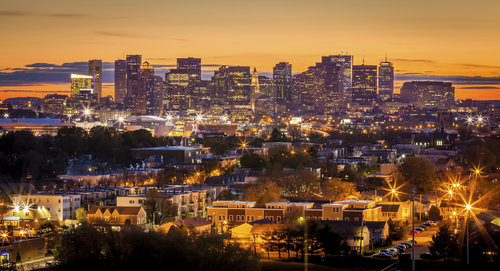For years, transportation advocates in Boston have urged the building of a tunnel connection between the city’s North and South stations that they say would ease commuter headaches and open up underused plots of land for development.
The North South Rail Link, which is supported by a bevy of current and former politicians, would “improve efficiency, mobility and capacity throughout Massachusetts, New England and the Northeast Corridor,” according to Citizens for the North South Rail Link.
The station itself, if approved, would require huge physical and financial dedication — a Harvard Kennedy School study found that it could cost $3.8 billion to $6 billion — and its ripple effect on the city would be even greater. Because Boston’s housing market hasn’t been able to keep up with its exponential job growth, land use experts say the connecting tunnel would make large swaths of land accessible by public transportation.
An advisory panel assembled by the Urban Land Institute recently convened to strategize just how Boston’s builders and developers should handle the inevitable impact of the proposed tunnel on the city’s market.
“Boston’s commuter rail and transit system is a unique asset that offers the region a strategic advantage over other metropolitan areas, both nationally and globally,” said ULI leader and panel chairman Marilee Utter, president of Citiventure Associates in Denver. “Yet, the region’s ability to maintain its quality of life and compete globally is seriously at risk if it does not take a comprehensive approach to a unified rail system that leverages the tools of real estate development, public/private partnerships and transit-oriented development to achieve these goals.”
Connecting the dots
The panel, made up of land use professionals that specialize in urban development and design, issued a list of priorities that should be addressed as the tunnel is planned upon approval.
First, and probably most obvious, is to strengthen links between housing and job centers, according to ULI. In doing so, the board says developers should preserve high-value land in the urban core for real estate.
Meanwhile, they should fulfill Mayor Martin J. Walsh’s goals to increase affordable housing in the city, as the ULI board says a priority should be to increase social equity by building affordable housing at transit notes, as well as improve rail and mobility access for traditionally underserved communities.
The ULI board wasn’t just focused on the North South Rail Link — it advises all parties to prioritize transit-oriented developments for stations along all commuter rail and T subway lines.
Finally, all developers should take into consideration the changing climate and incorporate climate resilience in future projects. The potential impact of severe weather is fresh on many Bostonians’ minds, as snowstorms in early January caused tides to reach their highest levels in nearly 100 years.

